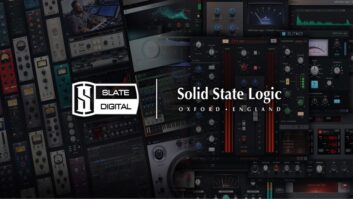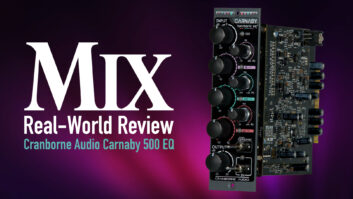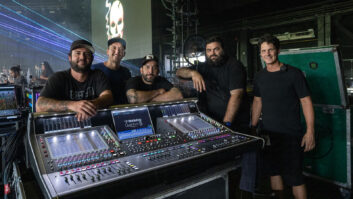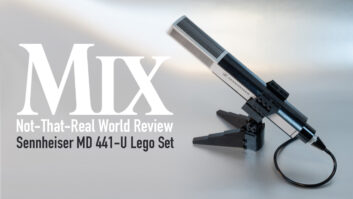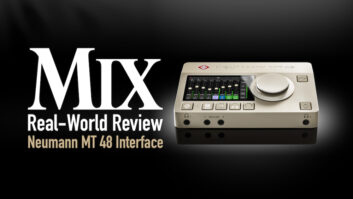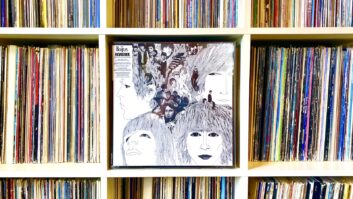Steve Marcantonio, general manager and chief engineer at Sound EmporiumNashville’s Sound Emporium Studios is among the truly historic, legacy studios that have played a foundational role in helping build what the Music City is today—the engine behind some of the most popular and creative music in the world. Obviously, Nashville’s place in the music world could not have been realized without talented artists, producers, engineers and studio environments such as Sound Emporium, which first opened its doors more than 40 years ago.


Sound Emporium has been host to a “who’s who” of artists over the last several decades and not just in the genre of country music. Over the course of its history, it has also been witness not only to the evolutions of the music scene, but has also gracefully weathered the twists and turns of the studio industry itself. Sound Emporium has proven its resilience time and time again as the industry has experienced both upheaval and reinvention.
Studios with storied legacies rely on experienced professionals to help shepherd their success, and Sound Emporium is no exception. Over the course of its history, Sound Emporium has had no shortage of visionary owners at the helm to guide it through sometimes-unpredictable waters. People such as founder “Cowboy” Jack Clement, Garth Fundis and current owner George Shin have helped make Sound Emporium what it is today. More recently, the studio has landed another Nashville veteran and heavy-hitter to help chart its course for the future: Steve Marcantonio.
Marcantonio, whose official title is general manager and chief engineer, has been an engineer for the better part of 30 years, and started his career at The Record Plant in New York where he gained tons of experience interfacing with clients: among them John Lennon. It is clear that his tenure there instilled a very strong work ethic and sense of discipline that has served him well over the years. “The way [The Record Plant] ran its facility was by far the best I’ve ever seen,” says Marcantonio. “What has really stuck with me all these years was the way we were taught to react and interact with clients and work in the studio. Anytime I had an assistant or had a session, the way we did things at The Record Plant was a standard of comparison,” a standard of professionalism he will insist upon for Sound Emporium.
After he gained his start in New York, Marcantonio was soon recruited to Nashville by artist Rodney Crowell, and since arriving, the allure of this city hasn’t been lost on him for a minute: “Here in Nashville, they say it’s all about the song, and I always like to think that’s true,” he says. “I just love recording great songs, and each day it blows me away; that’s why I’m doing what I do.”
Since Marcantonio was already well established with a proven track record of success in the Nashville studio scene, he was a natural choice to take the reins at Sound Emporium. “This situation came up, and it was just perfect,” he recalls. “I think it’s a great gig for an engineer to run a studio, because engineers are sensible about what needs to be done. There are a lot of great managers out there who have had some experience in a session, but having been a competitive engineer in this town, I think I’ve got a real advantage.”
Marcantonio appreciates the gravity of Sound Emporium’s history, and the people behind it. “Tim Smith, a friend who is a producer/ arranger/bass player, is friends with George Shin, who owns the studio,” he explains. “When this facility became an option, we both got very excited because of the history. The first thing I thought about was that I can’t let those people down—people like Jack Clement and Garth Fundis. Jack, of course, made this place what it is, and Garth fixed it up and carried on the tradition.” While he does intend to make some improvements and refreshes in the facility, Marcantonio is cautious about leaving the vibe and legacy fully in tact. “We will make some tweaks here and there, but will certainly continue what Cowboy Jack started and what Garth set forth.”
Outlining potential changes that won’t upset the balance of tradition, Marcantonio says, “Unlike other studio owners who might hire someone to run their place and change a lot about it to get more business, we don’t want to do that here.” He sees opportunities for improvements both in equipment and the overall space—mainly in Studio B, where he would like to add some API 500 preamplifier modules to sit beside the Trident 80B console—which he anticipates will be fully refurbished in the near future. “We are going to replace the faders and modify the monitor side,” he says. “Also, I would like to double the amount of outboard we have in Studio B. The APIs will be a great addition, because they take up very little space and can improve the overall sound.”
Marcantonio also has his eyes set on a dedicated lounge for Studio B and will also be initiating some acoustic adjustments in that studio. “If we tame down some of the live room and tweak the booths, Studio B could be a fantastic rock ’n’ roll facility,” he says. For the most part, he intends to leave Studio A untouched. “I’ve seen people react to the energy in that room, and you always seem to get a sense of the people who have been there in the past.” Studio A is anchored by a 48-channel Neve VRP console with Avid Pro Tools HD and a Studer A827 24-track, ample outboard gear and a classic microphone collection.
Overall, Marcantonio is optimistic, not just for the prospects of Sound Emporium, but for Nashville and the broader music scene at large. “I would love to be part of bringing back the way Music Row was—a more collaborative thing,” he concludes. “And you know what? In the first few months, it has worked.”
Jeff Touzeau is a regular contributor to Pro Sound News and author of five books, including Sound Ideas for a Sound Planet: The Green Musician’s Guide (Cengage).
Sound Emporium
soundemporiumstudios.com

